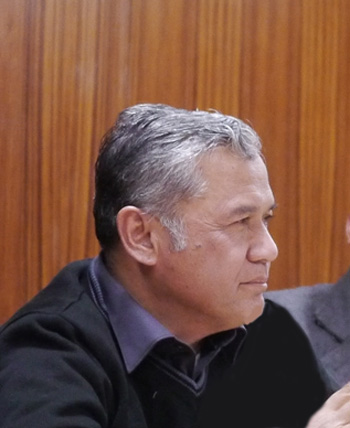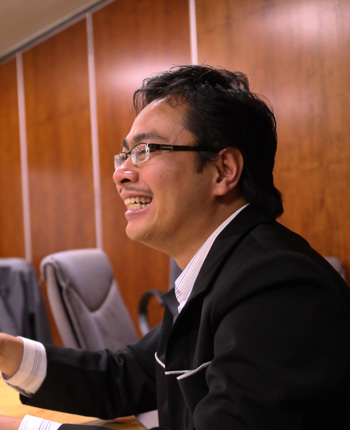FPI adalah Front Pembela Islam.
Kalau melakukan perbuatan kekerasan / perusakan, bukan lagi Islam,namanya berobah menjadi Front Pembela Iblish.
Karena yang suka melakukan kekerasan / perusakan itu hanya Iblish / Syaitan.
Iblish sangat licik menipu manusia, bahkan ulama2 pun bisa ditipunya.
ALLAH berfirman;
[QS 43:37] Dan sesungguhnya setan-setan / iblish itu benar-benar menghalangi mereka dari jalan yang benar dan mereka menyangka bahwa mereka mendapat petunjuk.
[QS 2:168]sesungguhnya setan / Iblish itu adalah musuh yang nyata bagimu. [169] Sesungguhnya setan itu hanya menyuruh kamu berbuat jahat dan keji, (perbuatan2 kekerasan,perusakan dan pembunuan dll ).
ALLAH menciptakan Iblish dari api yang panas.
Kalau Iblish / Syaitan menunggangi manusia maka;
--muka dan matanya merah seperti merah api yang panas, kata kata yang keluar dari mulutnya juga kasar dan buruk, marah atau emosi, dan perbuatan2nya merusak, zolim dan bahkan mudah membunuh lawan2nya.
Itulah bahayanya manusia Iblish atau syaitan yang ada dalam masarakat.
ALLAH berfirman; Hati2 Srigala berbulu domba yang akan menerkam dari dalam.
Coba anda perhatikan orang2 yang melakukan perbuatan kekerasan /perusakan dan penindasan kepada muslim Ahmadiyah dan pemilik2 warung seperti di vedio dibawah ini;
ALLAH berfirman;
[QS 43:37] Dan sesungguhnya setan-setan / iblish itu benar-benar menghalangi mereka dari jalan yang benar dan mereka menyangka bahwa mereka mendapat petunjuk.
[QS 17:53] Sesungguhnya setan / Iblish itu menimbulkan perselisihan di antara mereka. Sesungguhnya setan / Iblish itu adalah musuh yang nyata bagi manusia.
[QS 2:168]sesungguhnya setan / Iblish itu adalah musuh yang nyata bagimu. [169] Sesungguhnya setan itu hanya menyuruh kamu berbuat jahat dan keji, (perbuatan2 kekerasan,perusakan dan pembunuan dll ).
ALLAH menciptakan Iblish dari api yang panas.
Kalau Iblish / Syaitan menunggangi manusia maka;
--muka dan matanya merah seperti merah api yang panas, kata kata yang keluar dari mulutnya juga kasar dan buruk, marah atau emosi, dan perbuatan2nya merusak, zolim dan bahkan mudah membunuh lawan2nya.
Itulah bahayanya manusia Iblish atau syaitan yang ada dalam masarakat.
ALLAH berfirman; Hati2 Srigala berbulu domba yang akan menerkam dari dalam.
Coba anda perhatikan orang2 yang melakukan perbuatan kekerasan /perusakan dan penindasan kepada muslim Ahmadiyah dan pemilik2 warung seperti di vedio dibawah ini;
Benar bukan?
AKAR KONFLIK DALAM UMAT ISLAM KARENA MERUJUK KEPADA HADITS PALSU, HADITS CIPTAAN MANUSIA IBLISH, BUKAN KEPADA AL QURAN DALAM MENEGAKAN"AMAR MAKRUF NAHI MUNGKAR".
Assalamu'alaikum wrwb
Kalau kita lihat dalam masarakat kenapa dalam umat Islam sering terjadi konflik atau perbuatan kekerasan sesama saudara muslim atau dalam bangsa yang plural ini?
Kenapa umat Kristen dapat hidup lebih damai - harmoni dan sejahtera dari umat Islam?
Alhamdulillah,semoga ALLAH memberikan saya ilmu dan melindungi dari tipu daya syaitan yang terkutuk.
1.Pertama kenapa sering terjadi konflik atau perbuatan2 kekerasan dalam umat Islam?
Akarnya adalah dimana klompok Islam Garis Keras seperti FPI,FUI,MMI,JAT dan MUI merujuk kepada sebuah hadist Palsu yang mana bertentangan dengan al Quran seperti Hadits di bawah ini dalam menegakan "amar makruf nahi mungkar"
"Siapa saja di antara kalian yang melihat kemungkaran,hendaklah is mengubah dengan TANGAN MU:jika tidak mempu, hendaklah dengan lisannya; jika tidak mampu hendaklah dengan hatinya.Akan tetapi,yang demikian adalah selemah lemahnya iman.HR.Muslim"
Dengan tangan diartikan membuat undang2 untuk melarang firqoh2 Islam yg berbeda dgn mereka, dan bahkan dgn tangan mereka merusak dan membunuh lawan2nya.
Dengan tangan diartikan membuat undang2 untuk melarang firqoh2 Islam yg berbeda dgn mereka, dan bahkan dgn tangan mereka merusak dan membunuh lawan2nya.
Reiziq Shihab,Pemimpin FPI merujuk kepada hadits diatas itu dalam menegakan "amar makruf nahi mungkar " Lihat pidato Raziq Shihab di Video ini;
Inilah bukti2 perbuatan kekerasan dari melaksanakan hadist Palsu itu;
Perusakan warung2 yang mencari uang dalam bulan puasa;
3 orang muslim Ahmadiyah terbunuh;
Massa FPI Serukan Serbu Masjid Ahmadiyah Terdekat
Akirnya Rizieq Shihab di tahan 1.5 tahun sebagai hukuman.
Warga yang menolak kehadiran FPI di daerahnya
Jadi tidak heran kalau dalam masarakat Islam sering terjadi bentrokan bahkan perusakan dan pembunuhan2 sesama muslim dan sebangsa.
ALLAH memerintahkan kepada umat Islam wajib menegakan amar makruf nahi mungkar dengansantun dan baik2 dalam masarakat seperti ayat ALLAH ini, bukan dengan kekerasan dan paksaan;
(1) Kamu adalah umat yang terbaik yang dilahirkan untuk manusia, menyuruh kepada yang makruf, dan mencegah dari yang mungkar, dan beriman kepada Allah..QS.3:110(2) "Dan hendaklah ada di antara kamu segolongan umat yang menyeru kepada kebajikan, menyuruh kepada yang ma'ruf dan mencegah dari yang munkar" (QS. Ali Imron 3:104)
(3) "Dan suruhlah manusia mengerjakan yang baik dan cegahlah mereka dari perbuatan yang mungkar, lalu bersabarlah terhadap apa yang akan menimpamu.Sesungguhnya yang demikian itu termasuk hal-hal yang diwajibkan (oleh Allah)"(QS. Luqman 31:17).
(3) "Dan suruhlah manusia mengerjakan yang baik dan cegahlah mereka dari perbuatan yang mungkar, lalu bersabarlah terhadap apa yang akan menimpamu.Sesungguhnya yang demikian itu termasuk hal-hal yang diwajibkan (oleh Allah)"(QS. Luqman 31:17).
Bagaimana ALLAH memerintahkan untuk mencegah perbuatan2 mungkar tersebut?
Apakah benar dengan menggunakan tangan untuk merusak,membunuh orang lain?
ALLAH berfirman kepada Rasul sebagai berikut ini;
Maka berilah PERINGATAN ,(kepada peminum2alkohol, wanita2 penari,penjudi2 atau kepada penyembah2 berhala, ajaran2 sesat dll) karena sesungguhnya kamu hanyalah orang yang memberi peringatan. Kamu bukanlah orang yang berkuasa( diktator, atau
orang yang memaksa) atas mereka. Tetapi orang yang berpaling,khafir(ingkar,melawan), maka ALLAH akan mengazabnya dengan azab yang besar..(QS.88;21-22).
"Tugas kamu(Muhammad) hanya menyampaikan saja. Kami lah yang menghisab perbuatan2 mereka" dan QS.13:40.
"Jika sekiranya kamu bersikap keras,kasar,jahat budi pekerti, berhati kasar (tidak lemah lembut, tidak senyum ), niscaya larilah tamu-tamu itu dari kamu."(QS.3:159 ). (Anti kekerasan).
Jika mereka tetap berpaling,maka sesungguhnyakewajiban yang dibebankan ataskamu(Muhammad) hanyalah menyampaikan (amanat ALLAH ) dgn terang Qs 16 :82.
orang yang memaksa) atas mereka. Tetapi orang yang berpaling,khafir(ingkar,melawan), maka ALLAH akan mengazabnya dengan azab yang besar..(QS.88;21-22).
"Tugas kamu(Muhammad) hanya menyampaikan saja. Kami lah yang menghisab perbuatan2 mereka" dan QS.13:40.
"Jika sekiranya kamu bersikap keras,kasar,jahat budi pekerti, berhati kasar (tidak lemah lembut, tidak senyum ), niscaya larilah tamu-tamu itu dari kamu."(QS.3:159 ). (Anti kekerasan).
Jika mereka tetap berpaling,maka sesungguhnyakewajiban yang dibebankan ataskamu(Muhammad) hanyalah menyampaikan (amanat ALLAH ) dgn terang Qs 16 :82.
[QS 64:12] Dan taatlah kepada Allah dan taatlah kepada Rasul, jika kamu berpaling maka sesungguhnya kewajiban Rasul Kami hanyalah menyampaikan (amanat Allah) dengan terang.
KESIMPULAN;
Jelaslah bahwa menegakan amar maruf nahi mungkar bukan dengan tangan atau dengan kekerasan atau dengan paksaan, seperti dilakukan oleh klompok Islam garis Keras FPI cs; tapi dengan santun, dan baik2. Tugas Muhammad saw bukan memaksa tapi sekedar mengingatkan saja dengan baik2 dan bersabar.
"Serulah(manusia) kepada jalan Robbmu dengan hikmah dan pelajaran yang baik dan bantahlah mereka dengan cara yang baik."
Jadi cara FPI menegakan amar makruf nahi mungkar adalah salah besar dan berakibat umat Islam menjadi kacau dan tidak aman serta kelihatan image islam yang ugly dan brutal.
Semoga hadits palsu yang berakibat fatal itu dapat di buang jauh2 dari umat Islam.
Mari kita sebarkan ajaran Islam yang santun,toleransi, damai dan berkasih sayang sesama manusia di bumi yang satu ini.Mari kita jauhi perbuatan2 kekerasan dan paksaan kepada orang lain yang berbeda keyakinan agama, dan style hidup dengan kita.
Harapan saya kepada pembaca budiman,semoga artikel ini dapat disebar luaskan kepada teman2, sekolah2, usztad2 dan ulama2 agar mereka dapat mengetahui bahwa Hadits itu adalah berbahaya dan mendatangkan konflik dalam masarakat Islam.
Terimakasih semoga ALLAH meramati para pembaca budiman.amin.
Harapan saya kepada pembaca budiman,semoga artikel ini dapat disebar luaskan kepada teman2, sekolah2, usztad2 dan ulama2 agar mereka dapat mengetahui bahwa Hadits itu adalah berbahaya dan mendatangkan konflik dalam masarakat Islam.
Terimakasih semoga ALLAH meramati para pembaca budiman.amin.
2. KENAPA UMAT KRISTEN DAPAT HIDUP LEBIH DAMAI-HARMONI DAN SEJAHTERA?
Di abad 13 bukanlah umat Kristen tidak pernah melakukan perbuatan2 kekerasan sesama Kristen, jutaan umat Kristen Protestan yang terbunuh dan melarikan diri dari negerinya karena di zolimi oleh Fundamentalis Katolik.
Sekarang di Era Technologi ini, pemerintah2 Barat memberikan jaminan berkeyakinan beragama dan tidak beragama serta memberikan kemerdekaan untuk menafsirkan Bible sesuai dengan masing2 sekte.
Disamping itu ulama2 Kristen mentaati peraturan2 ALLAH yang tertulis dlm Injil yaitu haram menjudge atau menghakimi keyakinan saudara2nya yang lain sebagaimana wahyu ALLAH di bawah ini;
ALLAH berfirman;
Ini kunci kedamaian antara beragama di Amerika Serikat.
Do not judge your brother’s faith, you will be not judged.
For with what judgment you judge, with the same measure, it will be measured back to you.
Why do you judge your brother’s faith? Who do you think you are to judge other, We all stand before God’s judgment hereafter. God made laws, and only God can judge people’s faith.
Sekiranya pastor2 di benarkan mengharamkan atau menjudge keyakinan orang lain, maka akan terjadi lah permusuhan antara sekte2 Kristen yang banyak itu.
Do not judge your brother’s faith, you will be not judged.
For with what judgment you judge, with the same measure, it will be measured back to you.
Why do you judge your brother’s faith? Who do you think you are to judge other, We all stand before God’s judgment hereafter. God made laws, and only God can judge people’s faith.
Sekiranya pastor2 di benarkan mengharamkan atau menjudge keyakinan orang lain, maka akan terjadi lah permusuhan antara sekte2 Kristen yang banyak itu.
Akirnya akan terjadi lagi penindasan dari golongan majoritas terhadap minoritas seperti pernah terjadi di Eropa di abad 13 dulu, dimana golongan majoritas katolik Fundamentalis mengharamkan dan menindas golongan Kristen protestan( reformer), jutaan umat protestan yang melarikan diri dari negerinya dan meninggal dunia gara gara berbeda keyakinan menafsirkan ayat2 ALLAH di Bible.
Yang berhak menghakim atau mengharamkan keyakian agama seseorang hanya ALLAH saja. ALLAH yang membuat peraturan2 maka ALLAH yang Maha tahu siapa yang benar dan siapa yang sesat.
Yang berhak menghakim atau mengharamkan keyakian agama seseorang hanya ALLAH saja. ALLAH yang membuat peraturan2 maka ALLAH yang Maha tahu siapa yang benar dan siapa yang sesat.
Allah berfirman:
God has made laws for His people, Only God can judge those who follow God's Laws or who does not. Who does you think you are to judge one another, you all will kneel before God's judgment hereafter.
Inilah salah satu lagi kunci kenapa masarakat Amerika dapat hidup damai-harmony in diversity.
Apakah ulama2 Islam dapat mentaati perintah ALLAH diatas itu?
Kalau semua ulama2 Islam terutama Ulama2 Islam Garis Keras seperti FPI mentaati perintah ALLAH itu,barulah akan tercapai umat Islam yang damai-harmoni dalam perbedaan2 menafsirkan ayat2 ALLAH.
Kalau tidak mentaati wahyu ALLAH diatas itu dan masih merujuk kepada hadits palsu selama itu pula umat Islam akan konflik sesamanya sampai hari kiamat.
Pesan saya kepada pengunjung2 page FPI ini dapat menyebarkan LINK INI kepada teman2 atau usztad2 atau ulama2 di sekeliling anda semoga hadits palsu itu tidak dijadikan sebagai hadits rujukan untuk menegakan amar makruf nahi mungkar seperti yang dilakukan oleh FPI cs.
Semoga bangsa kita ini dapat mencicipi masarakat yang damai-sejahtera yang dicita citakan oleh kita semua dari dulu sampai hari ini. Kalau sudah tercapai hidup yang damai, tanpa kekerasan dlm masarakat, barulah ALLAH akan memberikan rezeki yang berlimpah dari langit dan bumi sebagaimana ALLAH janjikan QS 7:96.
Pesan saya kepada pengunjung2 page FPI ini dapat menyebarkan LINK INI kepada teman2 atau usztad2 atau ulama2 di sekeliling anda semoga hadits palsu itu tidak dijadikan sebagai hadits rujukan untuk menegakan amar makruf nahi mungkar seperti yang dilakukan oleh FPI cs.
Semoga bangsa kita ini dapat mencicipi masarakat yang damai-sejahtera yang dicita citakan oleh kita semua dari dulu sampai hari ini. Kalau sudah tercapai hidup yang damai, tanpa kekerasan dlm masarakat, barulah ALLAH akan memberikan rezeki yang berlimpah dari langit dan bumi sebagaimana ALLAH janjikan QS 7:96.

